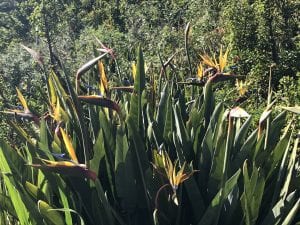LTS faculty often travel internationally as part of their work, since language teaching and learning is often very connected to international interactions. This week’s blog feature’s LTS Director Keli Yerian’s unusually far-reaching travel this past week in early July – to the southern tip of Africa in Capetown.
Why were you visiting Capetown?
My research interests are in language and gesture, particularly in how language teachers learn to use their bodies as an integral part of language teaching when the learning context is face-to-face. There is an association called the International Society for Gesture Studies that holds a conference every two years, and this year it was held in South Africa.
Did you present at the conference?
This time I presented with my colleague from France, Marion Tellier, which whom I am co-authoring some comparative research studies with data from our program in LTS, and the MA teacher education program she directs in France. We are noticing some similar patterns of gesture development in both programs, as well as some contrasts that may be related to differing educational and cultural contexts. We are both very interested in how typical co-speech gesture becomes more stylized and conventionalized in specific ways when used in pedagogical situations for depicting content and for serving pragmatic purposes in interaction. Unfortunately we forgot to ask someone to take a photo of us presenting, so I can’t show one here!
Did you do anything else in Capetown?
For most of the conference, we were always in the same conference hotel. Breakfasts and lunches were all provided there. Unfortunately, exploring around the city after dark was not safe in the heart of the city, so we only went out to dinner in groups to nearby places. The legacy of apartheid was very apparent all around us, and safety issues were just one aspect of this. It was only about 25 years ago that explicit discrimination was ended in South Africa (people of color were denied equal rights in most imaginable ways), and one generation is not enough to change the effects of racism and unequal access to resources and opportunities. We were lucky to meet a few South Africans who talked to us quite frankly about this legacy, which we appreciated.
We did spend the last days combining work with fun trips. Some of us hiked to the top of Lion’s Head, which involved literally climbing up ladders built into the cliffs and pulling yourself up chains, and we visited an animal reserve where we saw lions, cheetahs, giraffes, and elephants. We also went to the very end of the cape – the tip of the continent of Africa – that was impressive! Finally, we visited the famous botanical gardens. The birds of paradise flowers looked like a flock of cranes peering out of the bushes.
 It was the middle of winter there, so the weather was cool. Luckily the country had recently had some good rain; there was a water crisis before we arrived that was better by the time we were there, but we still took 30 second showers and didn’t let faucets run. It made me really appreciate the delicious water here in Eugene.
It was the middle of winter there, so the weather was cool. Luckily the country had recently had some good rain; there was a water crisis before we arrived that was better by the time we were there, but we still took 30 second showers and didn’t let faucets run. It made me really appreciate the delicious water here in Eugene.
I doubt I’ll ever return there, but if any of you get the chance, I recommend it!





